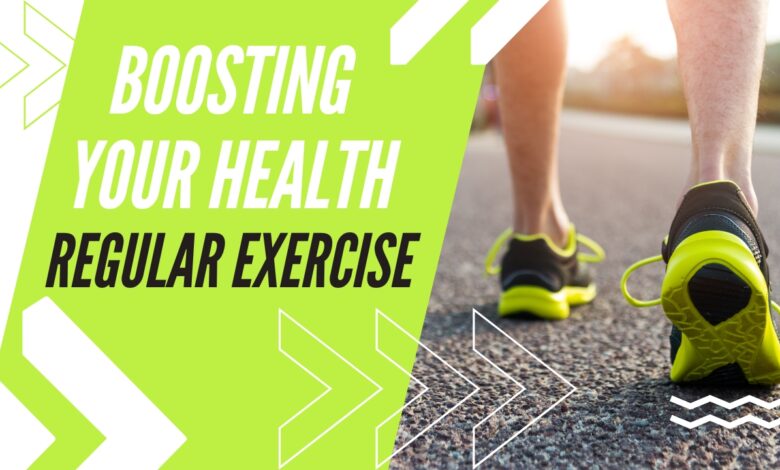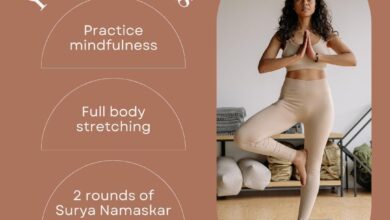Boosting Your Health with Regular Exercise

Exercise is a key component of a healthy lifestyle. Working out regularly can help you improve your physical and mental health and boost your energy levels. Fitness and exercise can help to reduce your risk of serious health issues, such as heart disease and obesity. Physical activity can also improve mood, reduce stress, and enhance well-being. In this blog post, we’ll explore the many benefits of regular fitness and exercise and discuss how it can help you to live a healthier and more productive life.
The Benefits of Regular Exercise
Regular exercise benefits our overall well-being and greatly contributes to a healthy lifestyle. Not only does it help in maintaining a healthy weight, but it also reduces the risk of chronic diseases such as heart disease, diabetes, and certain types of cancer.
Engaging in physical activity regularly also improves mental health and well-being. Exercise has been proven to reduce symptoms of depression, anxiety, and stress. It releases endorphins, the body’s natural mood elevators, making you happier and more relaxed. Regular exercise also boosts energy levels and improves sleep quality, allowing you to feel more rested and rejuvenated throughout the day. It strengthens muscles and bones and enhances flexibility and balance, reducing the risk of falls and injuries as we age. Moreover, regular exercise is beneficial not just for the body but also for the mind. It improves cognitive function, memory, and concentration, making us more productive and focused in our daily tasks. In summary, regular exercise has numerous benefits that extend far beyond just physical fitness. It contributes to our well-being, promotes a Healthy Lifestyle, and enhances physical and mental health. So, lace up those sneakers, grab a friend, and start reaping the rewards of regular exercise today!
Types of Fitness and Exercise
Many types of fitness and exercise can help improve your Well-Being and promote a healthy lifestyle. Each type of exercise offers unique benefits, from aerobic activities to strength training. Aerobic exercises, such as running, swimming, or cycling, help to increase your heart rate and improve cardiovascular health. These types of exercises are great for burning calories and improving overall endurance. On the other hand, strength training exercises, like weightlifting or resistance training, can help build muscle strength and increase bone density.
In addition to these traditional forms of exercise, alternative options can help improve fitness and overall well-being. Yoga and Pilates, for example, focus on flexibility, balance, and core strength. These exercises can help improve posture, reduce stress, and increase body awareness.
Another popular form of exercise is High-Intensity Interval Training (HIIT), which involves short bursts of intense exercise followed by rest periods. This exercise can be very effective for burning calories and improving cardiovascular fitness. Overall, the key to finding the right types of Fitness and Exercise for you is to choose activities that you enjoy and that align with your fitness goals. Whether you prefer the adrenaline rush of a high-intensity workout or the mindfulness of a yoga class, incorporating various exercises into your routine will help promote a healthy and balanced lifestyle.
Getting Started with an Exercise Routine
When it comes to starting a fitness routine, it can be overwhelming. But don’t worry – taking small steps and building upon them can lead to a successful fitness journey. Before starting any exercise program, it is important to talk to your doctor, especially if you have any underlying health conditions. It is especially important for those with Atrial Fibrillation. When starting, focus on incorporating different types of exercise, such as cardio, strength training, and flexibility. Find activities you enjoy, such as dancing or hiking, to motivate you. Start slow and gradually increase the intensity and duration of your workouts. Tracking your progress is also important in keeping you motivated and seeing your improvement. There are various fitness apps and trackers that can help you keep track of your workouts and progress. Remember, the most important thing is to listen to your body and take rest days when needed. Don’t compare yourself to others, and celebrate your small victories. Incorporating fitness and exercise into your routine can greatly improve your overall well-being.
Sticking to Your Fitness Plan
Once you’ve established an exercise routine, it’s essential to stick to it consistently. Many people fall off track due to a lack of motivation or discipline, but you can maintain your fitness plan long-term with a few tips. Firstly, set realistic goals for yourself. Please ensure they are specific and measurable, such as aiming to run a 5k in a certain time or lifting a particular weight. It will help you track your progress and provide a sense of accomplishment. Next, find an accountability partner. Having someone to hold you accountable, such as a friend or personal trainer, can make a significant difference in staying on track. Mix things up to avoid boredom and burnout. Incorporate different exercises or classes, such as yoga or swimming, to keep your routine fresh. Finally, remember to celebrate your victories, no matter how small they may be. Recognize the effort you put in and the progress you’ve made.
The key to sticking to your fitness plan is establishing a routine, setting achievable goals, staying accountable, mixing things up, and celebrating your progress. With dedication and consistency, you’ll be well on your way to a healthier and happier lifestyle.
The Importance of Rest and Recovery
While regular exercise and fitness are important for overall health and wellness, taking time for rest and recovery is equally important. Exercise stresses our bodies and muscles, and recovery allows us to repair and build stronger muscles. Without proper rest, we risk injury and burnout.
Rest and recovery come in many forms, such as taking rest days in between workouts, incorporating stretching and yoga, and getting enough sleep each night. It’s important to listen to our bodies and give them time to recover, even if it means taking a break from exercise altogether.
In addition to preventing injury and burnout, rest and recovery can improve our overall fitness level. When our muscles have time to recover and repair, they become stronger and more resilient, allowing us to push harder in future workouts. Make sure to prioritize rest and recovery as part of your fitness routine. Incorporate active recovery, such as stretching and light movement, and schedule rest days to allow your body to recover fully. Remember, caring for your body is as important as challenging it through exercise.
Overcoming Obstacles to Fitness and Exercise
We all know the importance of regular exercise for our overall well-being and maintaining a healthy lifestyle. However, it can be challenging to stick to a fitness routine, and we can encounter various obstacles that hinder our progress. One common obstacle is a need for more motivation, especially regarding long-term fitness goals. To overcome this, you can break down your goals into smaller, achievable steps and celebrate each milestone you reach. Another common challenge is finding time for regular exercise in a busy schedule. Consider scheduling your workouts like any other important appointment to address this obstacle. Also, consider incorporating exercise into your daily routine, such as walking or biking to work or taking a quick fitness break during lunch.
Injuries can also present a challenge to fitness and exercise. However, there are always ways to modify exercises to work around injuries. Consulting with a physical therapist or personal trainer can also help develop a modified workout routine that is safe and effective. Finally, stress and mental health issues can significantly hinder regular exercise. In this case, you must find exercise activities that you enjoy and help reduce stress, such as yoga, tai chi, or nature walks. Incorporating mindfulness practices, such as deep breathing or meditation, can also help manage stress levels.
Remember that overcoming obstacles is essential to maintaining a healthy lifestyle through regular exercise. By staying motivated, making time for exercise, modifying workouts, and addressing mental health concerns, you can overcome any challenge and achieve your fitness goals.




